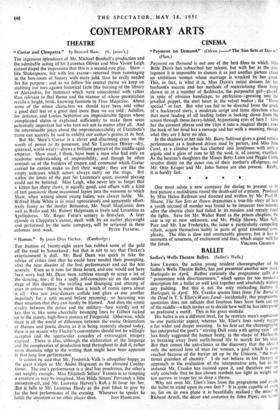CINEMA
"Payment on Demand." (Odeon.)—"The Sun Sets at Da.. (Plaza.) Payment on Demand is not one of the best films to which Miss Bette Davis has subscribed her talents, but with her as the rro- tagonist it is impossible to dismiss it as just another picture about an ambitious woman whose marriage is wrecked by her greed. This, in fact, is what it is, Miss Davis's initial dreams for her husband's success and- her methods of materialising them being shown us in a number of flashbacks, the purposeful girl—played. in spite of obvious handicaps, to perfection—growing into the jewelled puppet, the steel heart in the velvet bodice ; the " Davis special " in fact. But who can fail to be diverted from the griefs of a hackneyed story, a moderate script and tame direction when that most leading of all leading ladies is looking down from the screen through those heavy-lidded, hypnotising eyes of hers ? Give her the corniest phrase and she clips it into a magical shape ; even the back of her head has a message and her walk a meaning, though what they are I have no idea.
In the shadows at her side Mr. Barry Sullivan gives a good serious performance as a husband driven mad by parties, and Miss Jane Cowl, as a climber who has climbed into loneliness with only a gigolo and a glass of rum to fill. the ,void, is, of course, excellent.
As the heroine's daughters the Misses Betty Lunn and Peggie Castle revolve dimly on the outer rim of their mother's effulgence, and Mr. Otto Kruger and Mr. John Sutton are also present. Really, it. is hardly fair.
* One must salute a new company for daring to present as its first picture a melodrama round the death-cell of a-prison. Produced by Miss Helen Rathvon and directed and written by Mr. Paul H. Sloane, The Sun Sets at Dawn dramatises a true-life story of how a youth accused of murder was found to be innocent two minutes after the electric chair had failed in its mission and merely fused the lights. Save for Mr. Walter Reed as the prison chaplain, the cast is up to now unknown, and Mr. Philip Shawn, Miss Sally Parr and Mr. Lee Fredericks, the latter a particularly compelling villain, acquit themselves nobly in parts of great emotional com- plexity. The film is slow and unutterably gloomy, but it has its moments of tenseness, of excitement and fear, which augur well for






































 Previous page
Previous page